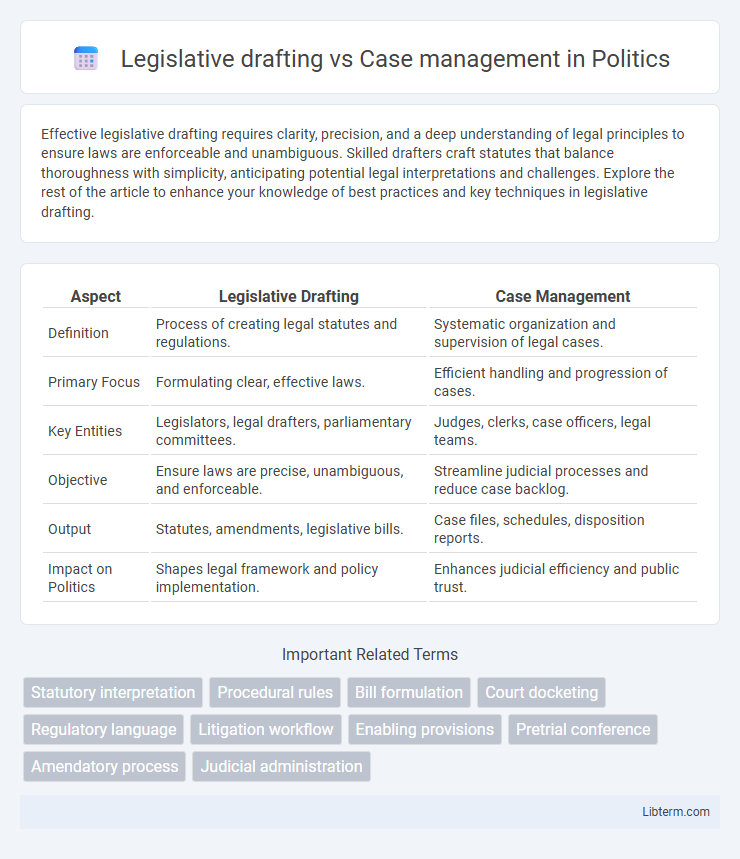Effective legislative drafting requires clarity, precision, and a deep understanding of legal principles to ensure laws are enforceable and unambiguous. Skilled drafters craft statutes that balance thoroughness with simplicity, anticipating potential legal interpretations and challenges. Explore the rest of the article to enhance your knowledge of best practices and key techniques in legislative drafting.
Table of Comparison
| Aspect | Legislative Drafting | Case Management |
|---|---|---|
| Definition | Process of creating legal statutes and regulations. | Systematic organization and supervision of legal cases. |
| Primary Focus | Formulating clear, effective laws. | Efficient handling and progression of cases. |
| Key Entities | Legislators, legal drafters, parliamentary committees. | Judges, clerks, case officers, legal teams. |
| Objective | Ensure laws are precise, unambiguous, and enforceable. | Streamline judicial processes and reduce case backlog. |
| Output | Statutes, amendments, legislative bills. | Case files, schedules, disposition reports. |
| Impact on Politics | Shapes legal framework and policy implementation. | Enhances judicial efficiency and public trust. |
Introduction to Legislative Drafting and Case Management
Legislative drafting involves the precise creation of legal documents, laws, and regulations to ensure clarity, coherence, and enforceability within legal systems. Case management focuses on organizing and coordinating legal cases efficiently, optimizing workflow, deadlines, and resource allocation to improve judicial outcomes. Mastery of legislative drafting equips practitioners with skills for policy formulation, while case management enhances procedural efficiency in legal practice.
Key Objectives of Legislative Drafting
Legislative drafting focuses on creating clear, precise, and enforceable laws that address public policy objectives and legal standards. The key objectives include ensuring legal clarity, promoting consistency across statutes, and anticipating potential interpretations to minimize ambiguities. This process requires comprehensive understanding of legal principles, stakeholder needs, and the legislative framework to produce effective regulatory texts.
Core Principles of Case Management
Case management centers on core principles such as client-centered planning, coordination of services, and continuous monitoring to ensure effective outcomes. Unlike legislative drafting, which focuses on precise legal language and statutory frameworks, case management prioritizes individualized assessment, resource optimization, and collaborative decision-making. Emphasizing communication, accountability, and ethical practice, case management facilitates tailored interventions that address clients' unique needs within complex systems.
Legislative Drafting: Process and Methodologies
Legislative drafting involves the precise formulation of legal texts using established methodologies such as plain language principles, statutory interpretation techniques, and iterative consultation with stakeholders. The process typically includes research, policy analysis, drafting, review, and revision stages to ensure clarity, consistency, and enforceability of laws. Effective legislative drafting balances technical accuracy with accessibility to enable smooth implementation and judicial interpretation.
Case Management: Procedures and Best Practices
Case management involves organizing and overseeing legal cases from initiation to resolution, emphasizing efficient scheduling, document control, and communication among parties. Best practices include implementing standardized procedures for case intake, maintaining accurate records, and employing technology such as case management software to track progress and deadlines. Proper case management enhances workflow efficiency, reduces errors, and ensures compliance with legal protocols.
Comparative Analysis: Drafting Law vs Managing Cases
Legislative drafting involves creating precise legal texts that define rights, obligations, and procedures, emphasizing clarity, consistency, and adherence to jurisdictional standards. Case management focuses on organizing, tracking, and resolving legal disputes efficiently, incorporating workflow optimization, document handling, and deadline monitoring. Comparative analysis reveals that drafting law centers on concept formulation and statutory coherence, while managing cases prioritizes procedural coordination and timely resolution within the legal system.
Roles of Legal Professionals in Drafting and Case Management
Legal professionals in legislative drafting focus on creating clear, precise statutes and regulations that reflect policy intent and comply with constitutional parameters, ensuring legal coherence and public accessibility. In case management, legal professionals coordinate evidence gathering, client interactions, and court procedures to streamline litigation and promote effective dispute resolution. Both roles demand strong analytical skills, legal knowledge, and attention to procedural detail, but legislative drafting prioritizes statutory formulation while case management emphasizes procedural efficiency and client advocacy.
Common Challenges in Legislative Drafting
Legislative drafting often faces challenges such as ambiguous language that leads to varying interpretations, complexity in aligning new laws with existing legal frameworks, and difficulties in addressing diverse stakeholder interests effectively. Case management, while distinct, shares some issues like managing procedural deadlines and ensuring clarity in documentation but focuses more on the administration of legal proceedings rather than law creation. Overcoming inconsistencies and ensuring precision remain critical hurdles unique to legislative drafting to produce clear, enforceable statutes.
Obstacles and Solutions in Case Management
Case management faces obstacles such as inconsistent documentation, delayed communication, and resource constraints that hinder efficient workflow and client outcomes. Implementing standardized digital platforms and real-time collaboration tools enhances information accuracy and accelerates case processing. Investing in comprehensive staff training and automated scheduling systems addresses workload imbalances and improves overall case management effectiveness.
Future Trends in Legislative Drafting and Case Management
Future trends in legislative drafting emphasize the integration of artificial intelligence and machine learning to enhance precision, consistency, and adaptability in legal texts. Case management is evolving towards automated workflow systems and real-time data analytics, enabling faster resolution and improved transparency. Both fields increasingly adopt digital platforms and cloud-based solutions to support collaboration and ensure regulatory compliance.
Legislative drafting Infographic

 libterm.com
libterm.com